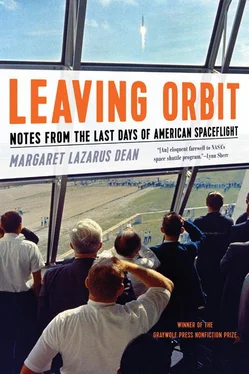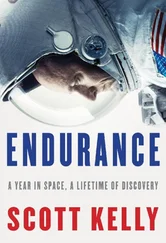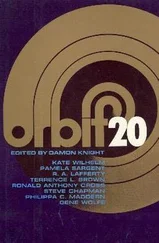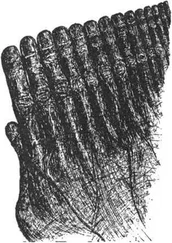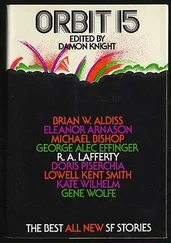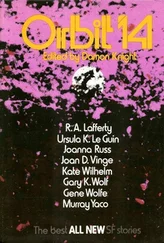I find myself unsure what to say to this. “I wonder if NASA feared that sending John Denver to space would have seemed more like a publicity stunt,” I offer.
Buzz furrows his brow at this. He seems to have no idea what I’m talking about.
“The whole point was publicity,” he says. “A schoolteacher might be a wonderful person, and teachers perform an important role in society, but a popular songwriter like John Denver reaches a lot more people. It’s just the numbers.” Satisfied, Buzz goes back to perusing my book. It’s true that Buzz’s own approach to publicity seems to bear out this philosophy.
When it’s time, we gather up our things and prepare to depart the safety of the green room. There is a growing crowd of space enthusiasts gathering outside, and it’s time to face them.
Buzz offers me his arm as we make our way toward the door, and I wish someone would take a picture of us so I can prove to my friends later that this is happening. On our way to the auditorium, we pass through a courtyard, where a table is set up for Buzz’s book signing after his talk; already a line of people, at least a hundred, snakes back and forth in front of the table. Some of those in the line are holding large stacks of books. It is an awkward moment, though one I suppose Buzz is accustomed to—passing within arm’s reach of the autograph seekers who would choose to stand out here for the duration of his talk, to hold their places in line rather than go inside to hear what he has to say. It’s uncomfortable to see the autograph seekers light up when they recognize Buzz, then look away sheepishly.
Luckily, there are still far more people who want to hear Buzz talk than those who hope to turn a profit from selling his signature. The auditorium seats sixteen hundred and is packed to capacity when we arrive. We loop our way around to the front, where seats have been reserved for Buzz, Lois, Buzz’s ghostwriter Ken Abraham, and me. I turn in my seat to take in the crowd, all of them watching us intently, and only then does my panic really set in. These people are hungry for Buzz Aldrin. You can see it in their eyes, especially the men of a certain age—the way they lean forward in their seats, fiddling nervously with their hands, searching Buzz’s face with awe. Squint a bit, and you can see them as little boys hunching in front of their TVs in the summer of 1969, their faces bathed in the silver light of the Sea of Tranquility.
I take the stage shakily and get through my introduction. I start with F. Scott Fitzgerald’s line about American lives not having second acts, a claim Buzz Aldrin’s life has clearly refuted. I run down a condensed list of Buzz’s accomplishments, quote from the plaque on the moon, refrain from weeping patriotically. Applause. Two minutes exactly.
Buzz Aldrin takes my place at the podium and faces an audience now applauding wildly. He greets the crowd.
They don’t stop clapping. In fact, they jump to their feet and clap harder.
Buzz Aldrin stands calmly at the podium. He is in no hurry. He watches me walk away, down the length of the long stage.
Then he turns to the audience and says, “Now, that’s a special lady.”
This is a polite gesture from Buzz, nothing more, but it’s a moment I expect to see play back before my eyes during any near-death experience. I feel the attention of the crowd flick to me, but they know better than to fall for the distraction. They return their attention to Buzz. The applause grows to a thunderous peak; no one is even thinking about sitting down. Buzz nods graciously, gestures for the crowd to quiet. Sort of a papal gesture.
I’ve never seen anything like this: it’s as if Elvis came back from the dead, or if the Beatles got back together. It’s palpable, this outpouring of love, of gratitude, just for his being here today, for having done what he did, so long ago.
* * *
Buzz Aldrin speaks for an hour with no notes. His verbal style is roundabout, tangential, loopy, anecdotes starting out and never quite reaching their points; clauses starting out and never quite reaching their verbs. He is charming and handsome and he has walked on the moon, and we hang on his every word. He tells stories about getting to the moon and back, about the world tour he, Neil, and Mike took upon their return, about the travel reimbursement form he received from NASA that detailed his work-related travel: Houston to Cape Canaveral; Cape Canaveral to Moon; Moon to Cape Canaveral; Cape Canaveral to Houston. His total reimbursement for the trip was thirty-three dollars. He tells us about his idea for the Aldrin Cycler, a series of spacecraft put into permanent orbits around Earth and Mars that would allow humans to travel to Mars by hopping from one to the next. (This proposal might sound silly coming from most public figures, but Buzz’s expertise in orbital mechanics demands that we take the idea seriously). He ends by telling us about his idea he calls ShareSpace—a way of paying for human spaceflight through a lottery. Buy a ticket, get a chance in a random drawing to be selected to go to space. If you don’t get chosen, you have the satisfaction of knowing that your money went to help further the project. It’s actually a pretty great idea.
After Buzz’s talk, followed by more thunderous applause, we make our way out to the table in the courtyard for the book signing. The line of people waiting now traces a winding path though the courtyard and out of sight, several hundred people at least. Buzz is unfazed. We take our seats at the table. Buzz greets the first person in line, signs the first book. The first person in line is, of course, a hard-core autograph collector—a white man in his forties, glasses and sweatshirt, with a workmanlike air and a complete lack of fawning. Though Buzz is polite, the exchange between them is one between people who have agreed to live with a certain amount of animosity. The autograph collector may in fact be a fan of spaceflight, may at one point have worshipped Buzz Aldrin and dreamed of being like him. Buzz, for his part, has probably met this autograph collector before, and at any rate has come to spot the type from a hundred paces. In addition to free events like this one, Buzz also participates in autograph trade shows, where attendees pay fees, often quite steep, for autographs. Buzz charges $500 for a simple autograph, more for signing an artifact, and even more as a “completion fee,” meaning a single photograph or artifact has been signed by all three Apollo 11 astronauts or both Gemini 12 astronauts. These items have exponentially higher value in the autograph market.
The autograph seekers: there are droves of them, wherever astronauts are to be found. A combination of fandom, profiteering, and cottage industry, the trade in autographs has created an offshoot to the public appearances of astronauts, especially moonwalkers. A person standing in line with a stack of four hardcover copies of Buzz’s book has invested about sixty dollars; once all the books are signed, the same stack will be worth hundreds or thousands of dollars. These people follow Buzz and the other moonwalkers everywhere they go, and their presence is both a reminder of the depth of fascination people have for astronauts and of the limitless drive to profit from that same fascination.
Buzz encounters autograph collectors like this one at the trade shows, and in that context their relationship is more clearly defined—this man pays Buzz money, and in exchange Buzz signs whatever the man wants. But the man’s presence here today is a gray area—by showing up at a free book festival where Buzz is supporting his new book, the man is taking advantage of this appearance in a way that cheats the system, and both he and Buzz know it. The next in line is also an autograph collector, and the next. Buzz refuses to sign more than one book for the second man, though he’d done it for the previous one without complaint. The third autograph collector in line hands Buzz a book missing its title page. This is a trick some autograph collectors pull to get two autographs for the price of one book—he’d had Buzz sign the title page once, then knifed that page out to get the same book signed again. Buzz opens the book to find the title page gone, then slams it shut again and slides it back to the man with a scowl. The autograph collector accepts it and goes on his way without a word.
Читать дальше
